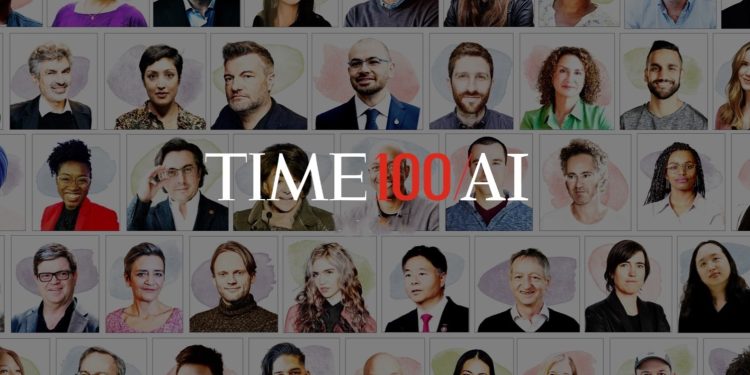In its inaugural TIME100 AI list, TIME magazine recognises eleven individuals of Indian and Indian American descent who actively contribute to the emerging technology sector and play pivotal roles in its application.
Among the honourees are remarkable personalities such as Sneha Revanur, who, at the age of eighteen, becomes the youngest recipient of this honour. Additionally, the list features Neal Khosla, son of renowned venture capitalist Vinod Khosla, and the billionaire siblings Romesh and Sunil Wadhwani, along with other accomplished individuals.
Revanur, the Founder and President of Encode Justice, stands out for her significant contributions. TIME reports that she recently played a crucial role in organising an open letter, urging congressional leaders and the White House Office of Science and Technology Policy to include more young voices on AI oversight and advisory boards.
Following her recognition, Sneha Revanur received an invitation to participate in a roundtable discussion on AI, hosted by Vice President Kamala Harris. Notable individuals of Indian and Indian American origin featured on the list include Neal Khosla, the CEO and Co-Founder of Curai Health, an AI-assisted telehealth startup established in 2017. Curai Health functions as a virtual assistant for doctors, handling routine tasks to enable them to focus on more complex medical work, according to TIME magazine.
Another standout individual on the list is Manu Chopra, the CEO of Karya, a non-profit organisation he founded at the age of 27. Karya has implemented a distinctive approach, ensuring its employees receive a minimum wage of $5.00 per hour, a rate approximately 20 times higher than India’s minimum wage. Moreover, employees are compensated each time a company licences Karya to create a new AI product.
Additionally, billionaire siblings Romesh and Sunil Wadhwani, founders of Wadhwani AI, have committed $60 million to their nonprofit organization since its inception in 2018.
Wadhwani AI aims to use artificial intelligence (AI) to address global development issues, particularly in regions where individuals live on incomes of less than $5 per day. Romesh Wadhwani, founder and chairman of SAIGroup, and Sunil Wadhwani, founder of the WISH foundation, have collaborated on this initiative, focusing on leveraging AI for social impact.
TIME100 AI List also includes Indian-origin individuals like Pushmeet Kohli, Vice President of Research at Google DeepMind, Kalika Bali, Principal Researcher at Microsoft Research India, and Arvind Narayanan & Sayash Kapoor, Professor and doctoral Candidate at Princeton University. These individuals have been recognised for their significant contributions to the field of artificial intelligence.
THE TIME 100 MOST INFLUENTIAL PEOPLE IN ARTIFICIAL INTELLIGENCE
Leaders:
- Dario and Daniela Amodei (Anthropic)
- Sam Altman (OpenAI)
- Demis Hassabis (Google DeepMind)
- Robin Li (Baidu)
- Clément Delangue (Hugging Face)
- Lila Ibrahim (Google DeepMind)
- Elon Musk (xAI)
- Raquel Urtasun (Waabi)
- Alex Karp (Palantir Technologies)
- Reid Hoffman (Entrepreneur and Investor)
- Greg Brockman (OpenAI)
- Marc Andreessen (Entrepreneur and Investor)
- Sandra Rivera (Intel)
- Aidan Gomez (Cohere)
- Daniel Gross (Entrepreneur and Investor)
- Kai-Fu Lee (Sinovation Ventures)
- Jaime Teevan (Microsoft)
- Andrew Ng (DeepLearning.AI)
- Kevin Scott (Microsoft)
- Jensen Huang (Nvidia)
- Clara Shih (Salesforce AI)
- Alexandr Wang (Scale AI)
- Mustafa Suleyman (Inflection AI)
- Marc Raibert (Boston Dynamics AI Institute)
Innovators:
- Ted Chiang (Writer)
- Charlie Brooker (Writer)
- Holly Herndon (Musician)
- Pelonomi Moiloa (Lelapa AI)
- Grimes (Musician)
- Neal Khosla (Curai)
- Stephanie Dinkins (Artist)
- Sougwen Chung (Artist)
- Cristóbal Valenzuela (Runway)
- Lilly Wachowski (Filmmaker)
- Manu Chopra (Karya)
- Kate Kallot (Amini)
- Ziad Obermeyer (University of California, Berkeley)
- Noam Shazeer (Character.AI)
- Alison Darcy (Woebot Health)
- Nathaniel Manning (Kettle)
- Tushita Gupta (Refiberd)
- Andrew Hopkins (Exscientia)
- Linda Dounia Rebeiz (Artist)
- Richard Socher (You.com)
- Keith Dreyer (Mass General Brigham)
- Nancy Xu (Moonhub)
- Rootport (Author of Japanese manga)
Shapers:
- Alondra Nelson (Institute for Advanced Study)
- Ian Hogarth (U.K.’s Frontier AI Taskforce)
- Audrey Tang (Minister of Digital Affairs, Taiwan)
- Meredith Whittaker (Signal)
- James Manyika (Google)
- Jack Clark (Anthropic)
- Anna Makanju (OpenAI)
- Omar Al Olama (Minister of Artificial Intelligence, UAE)
- Kelly McKernan (Artist)
- Eric Schmidt (Schmidt Futures)
- Margrethe Vestager (European Commission)
- Anna Eshoo (U.S. Congress)
- Richard Mathenge (African Content Moderators Union)
- Sneha Revanur (Encode Justice)
- Tristan Harris (Center for Humane Technology)
- Joy Buolamwini (Algorithmic Justice League)
- Eliezer Yudkowsky (Machine Intelligence Research Institute)
- Verity Harding (Cambridge University)
- Ted Lieu (U.S. Congress)
- Sarah Chander (European Digital Rights)
- Nina Jankowicz (Centre for Information Resilience)
- Romesh and Sunil Wadhwani (Wadhwani AI)
- Elham Tabassi (NIST)
- Dan Hendrycks (Center for AI Safety)
- Jess Whittlestone (Centre for Long-Term Resilience)
- John Honovich (IPVM)
Thinkers:
- Geoffrey Hinton (University of Toronto)
- Fei-Fei Li (Stanford University)
- Abeba Birhane (Cognitive Scientist)
- Shane Legg (Google DeepMind)
- Rumman Chowdhury (Humane Intelligence)
- Yi Zeng (Chinese Academy of Sciences)
- Timnit Gebru (Distributed AI Research Institute)
- Kate Crawford (USC Annenberg & Microsoft Research)
- Pushmeet Kohli (Google DeepMind)
- Ilya Sutskever (OpenAI)
- Yejin Choi (University of Washington)
- Yann LeCun (Meta)
- Inioluwa Deborah Raji (Mozilla Foundation)
- Max Tegmark (Future of Life Institute)
- Yoshua Bengio (Montreal Institute for Learning Algorithms)
- Emily M. Bender (University of Washington)
- Margaret Mitchell (Hugging Face)
- Paul Scharre (Center for a New American Security)
- Jan Leike (OpenAI)
- Paul Christiano (Alignment Research Center)
- Kalika Bali (Microsoft Research India)
- Stuart Russell (University of California, Berkeley)
- Arvind Narayanan & Sayash Kapoor (Princeton University)
- Shakir Mohamed (Google DeepMind & Deep Learning Indaba)











